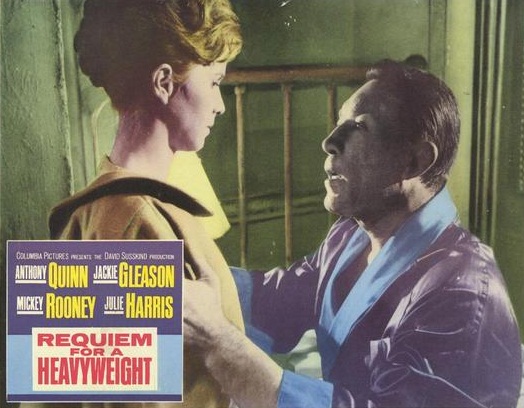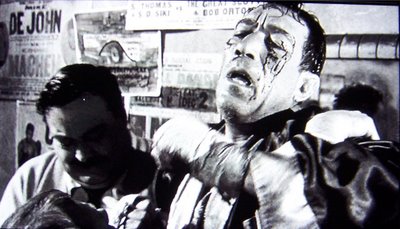[ad_1]
In its visible type and heady narrative, Requiem for a Heavyweight (1962) resembles few different movies of its style and ranks among the many biggest boxing films of all time. Nominally a movie noir but subverting the style’s conventions, in simply eighty-six minutes it furthers investigation into the which means of struggling plumbed in historic Greek tragedy, providing a grim imaginative and prescient of human nature as related within the fifth century B.C. because it was in 1962 and nonetheless is in the present day. No different movie about prizefighting appears to hate the “sport” a lot, whereas eulogizing certainly one of its doomed rivals for his capacity to endure the uncooked deal that seals his destiny.
Early within the story, after seventeen years as a heavyweight, forty-year-old Mountain Rivera will get knocked out in what turns into his final battle. The ring physician says his eye has sclerotic injury and one other blow might end in a indifferent retina or everlasting mind injury. Verbal sparring follows between Mountain’s coach Military (Mickey Rooney) and his promoter, Maish (Jackie Gleason), who states:
“At the least he walks away along with his brains. That’s greater than most.”
“Hm … that’s very humorous. Seventeen years, no less than he’s fortunate if he walks away along with his brains. It’s an incredible sport.”
“Sport? Are you kiddin’? If there was headroom, they’d maintain these items in sewers.”
Certainly, from ring judges to spectators, a complete rotten tradition talks and acts like rats. A haunting opening sequence holds an extended monitoring shot alongside a row of males standing at a bar, eyes and ears transfixed on a tv off-camera whereas a commentator provides a blow-by-blow account of Mountain’s brutal beating by Cassius Clay. The viewers embody a panorama of society’s males – black, white, fats, skinny, wealthy, poor – all united of their starvation for blood and drama, mutual hostilities in abeyance as they gentle one another’s cigarettes and drink and feast on the inhumanity of prizefighting. Later, as Military and Maish lead Mountain out of the ring and to the dressing room, a rabid viewers jeers and throws their popcorn and refreshments at him, screaming, “Get outta right here!”
The Prizefighter, then, is examined for his struggling and its significance, a hyperlink perceived way back to Greek antiquity. Whereas the Oresteia of Aeschylus envisions the progress borne of struggling producing the good achievements of civilization, Requiem for a Heavyweight questions the worth of Mountain’s existence the place pleasure is uncommon and ache is the norm. Because the movie ends his life might, or might not, be value residing.
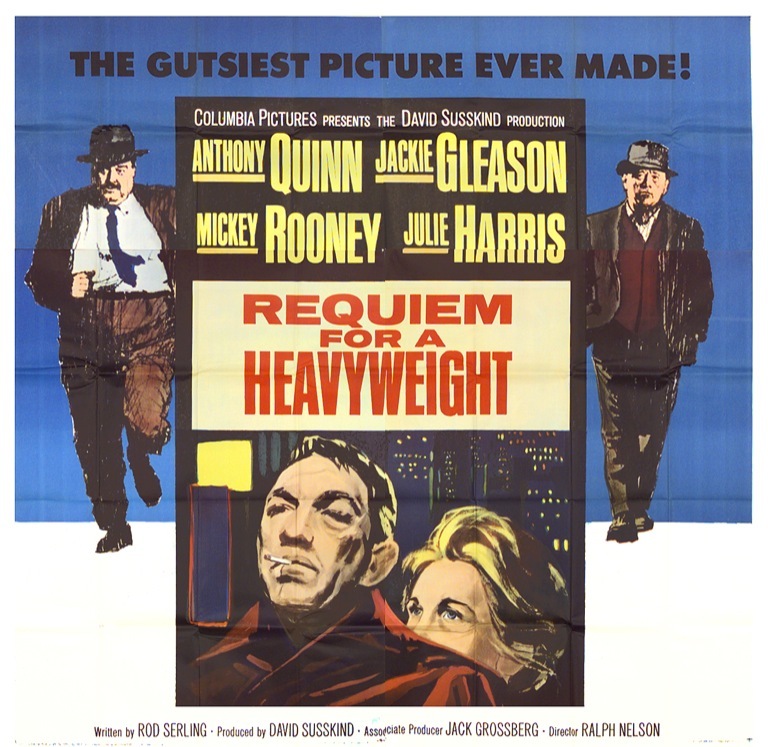
Our hapless Mountain is a husky-voiced and bruised bear with a grade six training and an enormous retailer of affection and loyalty, particularly for Maish, his father-figure. Mountain is aware of himself, holding no phantasm in regards to the limits of his private handicaps and achievements: “I received no particular issues. I’m an enormous, ugly slob, and I appear like a freak. However I used to be nearly heavyweight champion of the world.” The truth is, he was ranked quantity 5 in 1952, a 12 months, he provides, stuffed with champions like Rocky Marciano and Archie Moore.
The sensible previous males of the Oresteia inform of Zeus who “lays it down as regulation/ that we should endure, endure into reality,” thus advancing as people and as a society. But regardless that Mountain grows sensible to his fated subjection to the treachery of males, the reality brings him no development. The ultimate scene, by which he chooses to go on being exploited and humiliated, provides his ache a goal of heartrending ambiguity.
Maish, too, whereas a self-centred schemer, earns sympathy in how a lot he loves his “son.” When Mountain apologizes for shedding and letting him down, Maish’s eyes effectively up and he actually desires to imply it when he says, “So far as I’m involved, you had been primary.” However all alongside Maish knew that Mountain would lose to a youthful, quicker Clay, betting a thousand {dollars} he’d get knocked out by the fourth spherical, plus one other thousand belonging to mob boss Ma Greeny. Mountain lasts till the seventh and now Maish has every week to pay Ma again, with curiosity, or die.
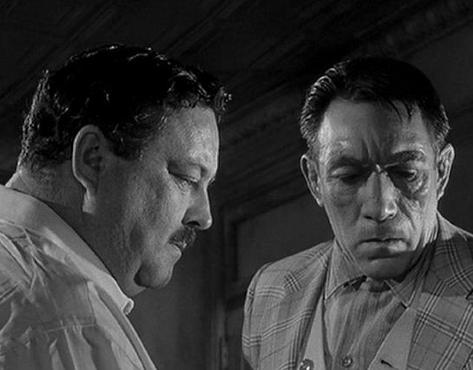
To lift the cash he forces Mountain to carry out staged wrestling matches and when Military berates him for making a idiot out of Mountain, Maish snaps, “So I’m sellin’ his soul on the road! He owes me. I determine it’s so simple as that.” Maish is aware of he’s mendacity although, guilt beading sweat on his forehead as he kilos his chest. He doesn’t wish to spoil Mountain however the mob is promising to kill Maish and survival justifies shame, disloyalty and betrayal.
The movie’s stark imaginative and prescient of life on the skids sharpens in its visible type. In contrast to the chiaroscuro contrasts of different movie noirs that play on gentle and shadow to show characters’ inside feelings, Requiem for a Heavyweight suggests inside truths in regards to the human situation. Gentle displays from mirrors onto the faces of protagonists, however direct gentle floods the mugs of villains. Bodily shadows solid by the latter seem darker and extra fluid, like globs of sepia, whereas shadows of the previous drift like mist. Pictures are framed in vertical bars and columns of sunshine set towards related patterns of shadow, battling and consuming each other, preserving stability. Nonetheless, like different “black movies,” its lowlifes wield phrases and weapons with equal violence. Even the ring physician talks within the hard-boiled, churlish tone of a gumshoe, insisting Mountain retire for good. Maish asks, “You bought any extra massive fats solutions?” The physician retorts, “Purchase him a scrapbook.”
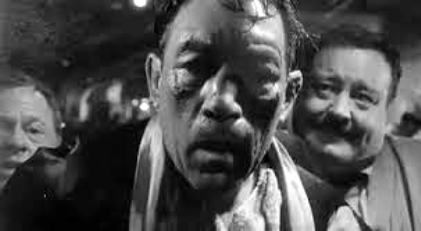
Nonetheless, as Mountain’s employment counsellor and potential love curiosity, no less than Grace airs her emotions with sensitivity and compassion. Blond and bespectacled, her smile aglow with hope, she feels a prodigious coronary heart beating inside Mountain’s deformed hulk. She makes it her mission to assist him land a job as counsellor at an all-boys’ sports activities camp, although in the end fails. In maybe probably the most heartbreaking scene, tears dribble down her cheeks as she laments to Maish that she helped Mountain solely as a result of she believed “the subsequent factor he wished, he should get. That may solely be honest. I want to God it was one thing I might have given him.” Maish scolds her for holding the phantasm that an “ape” like Mountain can escape the ceaseless struggling of his “breed.” He admonishes her to not “con” Mountain as a result of he’s “been chasin’ ghosts so lengthy he’ll imagine something. Championship belt. Fairly lady. Possibly simply 24 hours with out an ache in his physique. It doesn’t make any distinction. All of it handed him.”
Maish boils human life all the way down to an axiom: “The wealthy get richer and the poor get drunk.” The movie could also be saying in order effectively, doubting the traditional declare that struggling makes a greater world. Hating the barbarism of boxing as a lot as praising a fighter’s braveness to endure it, the movie affirms the absurd reality that pleasure intensifies within the face of brutality. A small masterpiece, Requiem for a Heavyweight leaves Mountain combating for freedom within the jaws of destiny. Striving to enhance his life could also be significant, if solely in its impossibility. – Marko Sijan
[ad_2]
Source link

